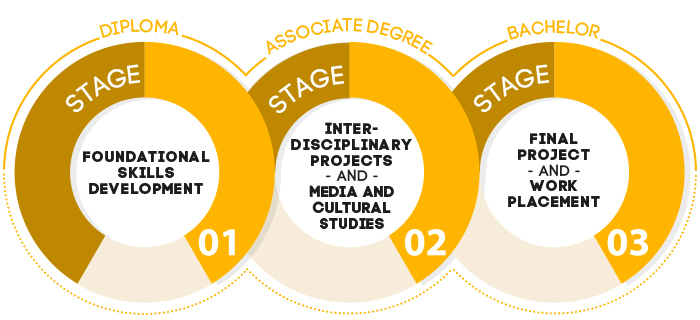Minimum Age
International students need to provide additional evidence of language skills including one of the following:
Making the leap from being a fan of film to becoming a force in film happens right here. Our bachelor degree puts you in the spotlight from day one, helping you gain the practical experience and technical knowledge needed to launch yourself in the world of motion picture.
Starting with the fundamentals and rolling through to the finer, more complex aspects of cinematography, you'll acquire a very particular set of skills during your time. Choose to specialise in either Production where the focus is on directing and producing or Post-Production where you’ll refine your skills in editing, composing and colour grading.
At SAE you won’t find yourself in a lecture with 300 people or even in a traditional lecture at all. You’ll be in a studio environment using industry-standard equipment like 4K Red, Sony and Canon cameras, DaVinci Resolve colour grading software, Avid Media Composer, and Adobe Creative Cloud.
Your growth and development will be assessed through the completion of industry-based projects, not theoretical based essays. This will ultimately help you build up a body of work and portfolio to share with potential employers or first client.
In preparation for an industry that commands agility and adaptability, you’ll cut your creative teeth on projects initially in partnership with your course peers. As your skills develop and you work on more dynamic projects, you’ll apply your capabilities on cross-discipline projects. By the end of your course you could be collaborating with fellow students across SAE’s global network.
Ultimately, this is all about a qualification that will expand your career. There is work placement as part of your course, to provide practical experience and help build your network. We’ll also equip you with employability skills, giving you professional strategies in communication and self promotion.
For those wanting to go the extra, and thousands of miles, you can complete up to two trimesters of your course at selected SAE campuses across the planet. Suddenly, real-world experience just went worldwide.
But most importantly at SAE, you'll see your ideas come to life as you prepare for a big future in front of you behind the lens.
The Film degree program is broken up into discrete stages, each designed to promote different skills.
Stage I – Foundational Skills Development
In Stage I, students will undertake a number of foundational units which will give students the essential technical skills and knowledge not only relevant to the chosen discipline area, but also give students the skills required to collaborate with other creative media students and professionals in later stages of the Film course.
Stage II – Interdisciplinary Projects, Media and Cultural Studies
In Stage II we show students how their work in Film contributes to and interacts with broader culture and media practice. This knowledge will enable students to work with a variety of other disciplines and artists and expand their potential on the global stage.
Students will complete a number of real-world projects with students not only in their own discipline, but also in all other SAE disciplines.
Stage II has three studio modules with projects based on the following areas;
1. Production
Both film specialisations have a strong common set of subjects covering the broad base the film industry requires. The Production specialisation focuses on targeting producing and directing skills specifically to this stream, strengthening the ‘big picture’ skill-set of graduates.
2. Post production
The Post Production specialisation adds more specific compositing and software curriculum elements to the common core subjects of this degree. Visual Effects are used in many more films than most people realise and these techniques are studied in this specialisation using industry standard software. Some of the high level software was traditionally very expensive and required major hardware installations in order to use. Software is now more accessible to students, increasing creative possibilities within the realm of all future filmmakers.
Stage III
Stage III is the final part of study. Here you will undertake an interdisciplinary project of choice to be the final and most ambitious portfolio project that a student will undertake.
Students will also finalise their studies by undertaking a Film elective module and completing a compulsory internship.


